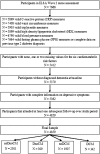Risk of dementia associated with cardiometabolic abnormalities and depressive symptoms: a longitudinal cohort study using the English longitudinal study of ageing
- PMID: 30370546
- PMCID: PMC6587526
- DOI: 10.1002/gps.5019
Risk of dementia associated with cardiometabolic abnormalities and depressive symptoms: a longitudinal cohort study using the English longitudinal study of ageing
Erratum in
-
Corrigendum.Int J Geriatr Psychiatry. 2022 Dec;37(12):10.1002/gps.5846. doi: 10.1002/gps.5846. Int J Geriatr Psychiatry. 2022. PMID: 36426746 Free PMC article. No abstract available.
Abstract
Objectives: Depression and cardiometabolic abnormalities are independently associated with a high risk of dementia. This study aimed to examine the association of comorbid depressive symptoms and cardiometabolic abnormalities with risk of dementia.
Methods: The sample comprised 4859 participants aged 50 or older without baseline dementia who took part in the English Longitudinal Study of Ageing (waves 2-7). Depressive symptoms were assessed using the Center for Epidemiologic Studies-Depression tool. Cardiometabolic abnormalities were defined as three or more cardiometabolic risk factors (inflammation, central obesity, raised triglycerides, low high-density lipoprotein [HDL] cholesterol, hypertension, and hyperglycaemia or diabetes). Participants were classified into four groups based on presence of depressive symptoms and cardiometabolic abnormalities. Results were analysed using the Cox proportional hazards regression adjusted for covariates.
Results: A total of 216 cases of incident dementia were reported over 10 years of follow-up. The group with high depressive symptoms only had an increased hazard of developing incident dementia during follow-up (HR = 2.68; 95%CI, 1.70-4.23), which was attenuated after adjustment for baseline cognition. No evidence was found for an association of overall cardiometabolic abnormalities with incident dementia; though hyperglycaemia, hypertension, and abdominal obesity with depressive symptoms had an unadjusted association with incident dementia. Only low-HDL cholesterol with depressive symptoms had an adjusted association with incident dementia (HR = 0.18; 95%CI, 0.04-0.75).
Conclusions: This work confirms depressive symptoms as a risk factor for incident dementia. However, low HDL-cholesterol with depressive symptoms may be protective against dementia, though more work is required to confirm this association.
Keywords: cardiometabolic risk factors; dementia; depression.
© 2018 The Authors. International Journal of Geriatric Psychiatry Published by John Wiley & Sons Ltd.
Conflict of interest statement
None declared.
Figures


Similar articles
-
Clustering of Cardiometabolic Risk Factors and Dementia Incidence in Older Adults: A Cross-Country Comparison in England, the United States, and China.J Gerontol A Biol Sci Med Sci. 2023 Jun 1;78(6):1035-1044. doi: 10.1093/gerona/glac240. J Gerontol A Biol Sci Med Sci. 2023. PMID: 36478065 Free PMC article.
-
Risk of Diabetes in Older Adults with Co-Occurring Depressive Symptoms and Cardiometabolic Abnormalities: Prospective Analysis from the English Longitudinal Study of Ageing.PLoS One. 2016 May 26;11(5):e0155741. doi: 10.1371/journal.pone.0155741. eCollection 2016. PLoS One. 2016. PMID: 27227974 Free PMC article.
-
Independent and combined effects of depressive symptoms and cardiometabolic risk factors on dementia incidence: a cross-country comparison in England, the United States and China.Arch Gerontol Geriatr. 2025 Sep;136:105889. doi: 10.1016/j.archger.2025.105889. Epub 2025 May 8. Arch Gerontol Geriatr. 2025. PMID: 40403595
-
Evaluating lifestyle and health-related characteristics of older adults with co-occurring depressive symptoms and cardiometabolic abnormalities.Int J Geriatr Psychiatry. 2016 Jan;31(1):66-75. doi: 10.1002/gps.4290. Epub 2015 Apr 1. Int J Geriatr Psychiatry. 2016. PMID: 25827712
-
Trajectories of depressive symptoms and the risk of cardiovascular, dementia, and pulmonary events in older adults: Evidence from the English Longitudinal Study of Ageing.Gen Hosp Psychiatry. 2025 May-Jun;94:199-205. doi: 10.1016/j.genhosppsych.2025.03.011. Epub 2025 Mar 21. Gen Hosp Psychiatry. 2025. PMID: 40147258
Cited by
-
Corrigendum.Int J Geriatr Psychiatry. 2022 Dec;37(12):10.1002/gps.5846. doi: 10.1002/gps.5846. Int J Geriatr Psychiatry. 2022. PMID: 36426746 Free PMC article. No abstract available.
-
Clustering of Cardiometabolic Risk Factors and Dementia Incidence in Older Adults: A Cross-Country Comparison in England, the United States, and China.J Gerontol A Biol Sci Med Sci. 2023 Jun 1;78(6):1035-1044. doi: 10.1093/gerona/glac240. J Gerontol A Biol Sci Med Sci. 2023. PMID: 36478065 Free PMC article.
-
Temporal dynamics in the association between depression and dementia: an umbrella review and meta-analysis.EClinicalMedicine. 2025 May 29;84:103266. doi: 10.1016/j.eclinm.2025.103266. eCollection 2025 Jun. EClinicalMedicine. 2025. PMID: 40687743 Free PMC article.
-
Cardiometabolic multimorbidity, genetic risk, and dementia: a prospective cohort study.Lancet Healthy Longev. 2022 Jun;3(6):e428-e436. doi: 10.1016/S2666-7568(22)00117-9. Lancet Healthy Longev. 2022. PMID: 35711612 Free PMC article.
-
Sex-specific muscle and metabolic biomarkers associated with gait speed and cognitive transitions in older adults: a 9-year follow-up.Geroscience. 2020 Apr;42(2):585-593. doi: 10.1007/s11357-020-00163-7. Epub 2020 Jan 30. Geroscience. 2020. PMID: 32002783 Free PMC article.
References
-
- Wimo A, Jönsson L, Bond J, Prince M, Winblad B, International AD . The worldwide economic impact of dementia 2010. Alzheimers Dement. 2013;9(1):1–11. e3. - PubMed
-
- Prince M, Guerchet M, Prina M. The Epidemiology and Impact of Dementia: Current State and Future Trends. Geneva: World Health Organization; 2015.
-
- Hishikawa N, Fukui Y, Sato K, et al. Cognitive and affective functions in Alzheimer's disease patients with metabolic syndrome. Eur J Neurol. 2016;23(2):339‐345. - PubMed
-
- Ríos JA, Cisternas P, Arrese M, Barja S, Inestrosa NC. Is Alzheimer's disease related to metabolic syndrome? A Wnt signaling conundrum. Prog Neurobiol. 2014;121:125‐146. - PubMed
MeSH terms
LinkOut - more resources
Full Text Sources
Medical

